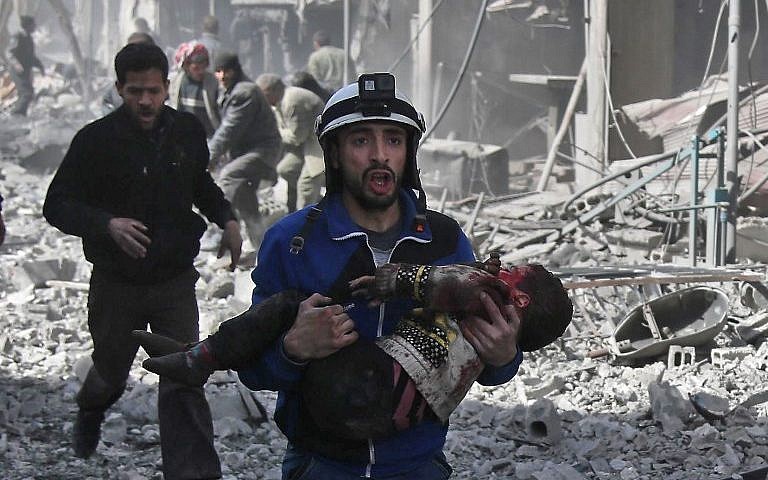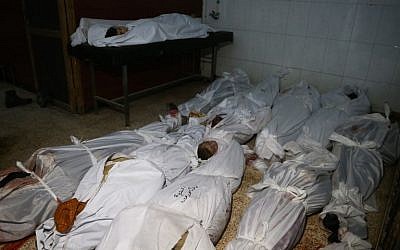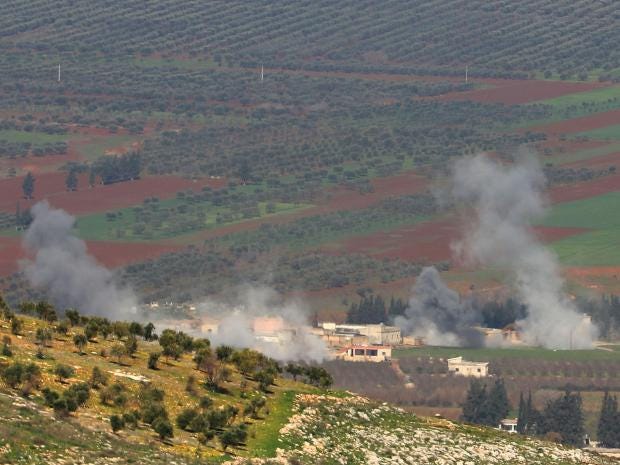Collegial Cooperation in Conflict : Syria
"February 19 was the one of the worst days that we’ve ever had in the history of this crisis."
"I opened his mouth [one-year-old baby with blue skin and faint pulse] to put in a breathing tube and I found it packed with dirt."
"This is just one story from among hundreds of wounded."
Abu al-Yasa, doctor, Eastern Ghouta
"Since this morning the bombing has not stopped."
"I was in the street and twenty rockets hit houses around me. The people are living as if they are dead."
Abu Jihad Darawi, Ghouta resident
 |
| A Syrian civil defense member carries an injured child rescued from between the rubble of buildings after a government bombing in the rebel-held town of Hammuriyeh, in the besieged Eastern Ghouta region on the outskirts of the capital Damascus, on February 19, 2018. (AFP Photo/Abdulmonan Eassa) |
"We no longer have the words to describe children’s suffering and our outrage."Over 400,000 people live in Eastern Ghouta. An enclave of Damascus, in the hands of the Sunni Syrian rebels whom Syrian President Bashar al-Assad contemptuously calls "terrorists", for spurning his Shiite-centric regime. The enclave has been surrounded by government troops since 2013, in a siege tactic meant to starve out the residents, forcing them to live with inhumane privation. Food, medicine, the very basic necessities of life have been denied the population.
"Do those inflicting the suffering still have words to justify their barbaric acts?"
UNICEF statement
In the hands of a variant array of rebels, some of them jihadists, zones of control have been claimed in Eastern Ghouta. There is also a Kurdish minority living there, but all have been denied humanitarian aid, punishment for having among them the presence of rebel militias, defiant of the rule of the Alawite regime whose assaults upon the civilian populations of Sunni Syrians have proven to be equally atrocious to the humanity-debased attacks of Islamic State whose dread slaughters have garnered it global disgust.
The latest attacks on Eastern Ghouta for three days straight have intensified the civilian death toll; "spinning out of control" is how the United Nations described the situation in the rebel area. Rocket and artillery fire, air strikes and an absolute dedication to cleansing the area of its fighters has battered the enclave in an apparent softening up of the area preparatory to a large ground onslaught planned for the besieged and suffering region.
According to the Syrian Observatory for Human Rights, about 200 civilians have died, a quarter of them children.
 |
| The bodies of civilians who were killed in Syrian army bombardment on the town of Hamouria in the rebel-held enclave of Eastern Ghouta are seen lying on the ground at a make-shift morgue the morning after the attacks on February 20, 2018. (AFP PHOTO / ABDULMONAM EASSA) |
Syrian state media claims that pro-regime forces were making preparations to move onward toward the Kurdish pocket of Afrin in northern Syria where Turkish forces were ordered by their president, Recep Tayyip Erdogan, to cleans the area of Kurdish YPG fighters whom he claims are aligned with the Kurdish PKK resistance fighters in Turkey. State media in Syria describe regime fighters prepared to fight alongside Kurdish troops from the People's Protection Units to "join the resistance against the Turkish aggression".
"If the regime is entering Afrin to oust the YPG, there is no problem. But if they are entering to protect the YPG, then no one can stop us", warned, Mevlut Cavusoglu, Turkey's foreign minister. Turkey's air and ground offensive against Afrin controlled by the Kurdish YPG has encountered a level of resistance from Afrin's Kurdish defenders far surpassing Turkey's expectations. However, Erdogan defended the slow progress of the operation, claiming to be cognizant of the need to avoid placing the lives of Turkish troops and Kurdish civilians at needless risk.
In the meanwhile, informing parliament in Ankara that Turkish troops alongside their Syrian rebel allies are preparing to lay siege to Afrin "in the coming days". According to Erdogan, the Kurdish People's Protection Units which control Afrin are a "terrorist" offshoot of the Kurdistan Workers' Party and he detests them all, and can think of no more appropriate punishment for them that they be routed by his troops, relinquishing the territory he aims to use as a protective ring along the border between Syria and Turkey.
Turkey has given warning it plans to open fire on regime forces should they fight alongside the Kurds, risking the prospect of a direct confrontation between Turkish and Syrian troops, with Russia apparently on the sidelines preparing to leap into action to put a stop to the situation if it appears to burgeon out of control. Moscow seems more than comfortable with Russian troops attacking Eastern Ghouta alongside the regime's forces, but draws the line at its two ostensible allies coming to blows between them.
The rows of small bodies of Syrian children bombed to death in the last several days, wrapped in their burial shrouds, does not appear to unduly faze Moscow or give it second pause, while the prospect of Turkey and Syria ferociously engaging on the battlefield targeting one another rather upsets Russian plans for everyone to get along together.
| Free Syrian Army fighters head towards Afrin as part of the Turkish operation [AP] |
"If the regime is entering Afrin to oust the YPG, there is no problem. But if they are entering to protect the YPG, then no one can stop us", warned, Mevlut Cavusoglu, Turkey's foreign minister. Turkey's air and ground offensive against Afrin controlled by the Kurdish YPG has encountered a level of resistance from Afrin's Kurdish defenders far surpassing Turkey's expectations. However, Erdogan defended the slow progress of the operation, claiming to be cognizant of the need to avoid placing the lives of Turkish troops and Kurdish civilians at needless risk.
In the meanwhile, informing parliament in Ankara that Turkish troops alongside their Syrian rebel allies are preparing to lay siege to Afrin "in the coming days". According to Erdogan, the Kurdish People's Protection Units which control Afrin are a "terrorist" offshoot of the Kurdistan Workers' Party and he detests them all, and can think of no more appropriate punishment for them that they be routed by his troops, relinquishing the territory he aims to use as a protective ring along the border between Syria and Turkey.
Turkey has given warning it plans to open fire on regime forces should they fight alongside the Kurds, risking the prospect of a direct confrontation between Turkish and Syrian troops, with Russia apparently on the sidelines preparing to leap into action to put a stop to the situation if it appears to burgeon out of control. Moscow seems more than comfortable with Russian troops attacking Eastern Ghouta alongside the regime's forces, but draws the line at its two ostensible allies coming to blows between them.
The rows of small bodies of Syrian children bombed to death in the last several days, wrapped in their burial shrouds, does not appear to unduly faze Moscow or give it second pause, while the prospect of Turkey and Syria ferociously engaging on the battlefield targeting one another rather upsets Russian plans for everyone to get along together.
"Ghouta is of major symbolic importance to the regime because it is so close to Damascus and it matters for economic and security reasons,."
"If the regime takes it, they can tell their supporters that the war is almost over and the opposition only controls some pockets in the north, east and south but not in what the regime calls ‘useful Syria’ in the west."
"Everyone is interested in reaching a deal: the regime, the Kurds, the Turks, the Russians. I think the question now is what that deal will look like but I don’t think the parties are interested in fighting each other."
Ibrahim al-Assil, fellow, Middle East Institute
 |
| Turkish-backed Syrian rebel fighters fire from the town of Salwah, less than 10 kilometres from the Syria-Turkey border, towards Kurdish forces from the People's Protection Units (YPG) in the Afrin region. AFP/Getty |
Labels: Afrin, Conflict, Damascus, Kurds Defence, Rebels, Syria, Turkey
0 Comments:
Post a Comment
<< Home